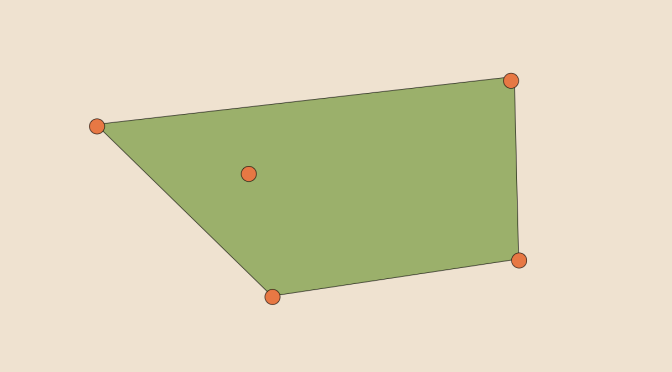We consider a topological vector space \(E\) over the field of the reals \(\mathbb{R}\). The convex hull of a subset \(X \subset E\) is the smallest convex set that contains \(X\).
The convex hull may also be defined as the intersection of all convex sets containing X or as the set of all convex combinations of points in X.
The convex hull of \(X\) is written as \(\mbox{Conv}(X)\).
Finite-dimensional case
We suppose in that paragraph that \(E=\mathbb{R}^n\) is an \(n\)-dimensional real vector space. One can prove in that case that any convex combination of points of \(X \subset E\) can be obtain be taking a convex combination of at most \(n+1\) points of \(X\). This is Carathéodory’s theorem:
\[\mbox{Conv}(X)=\{\sum_{k=0}^n p_k x_k | \sum_{k=0}^n p_k = 1, p_k \ge 0, x_k \in X \mbox{ for } 0 \le k \le n \}\] An interesting consequence is that in the finite-dimensional case, the convex hull of a compact subset of \(\mathbb{R}^n\) is compact. Indeed, consider a compact \(K \subset \mathbb{R}^n\) and the map:
\[\varphi : \left|
\begin{array}{ll} K^{n+1} \times \Sigma_n & \longrightarrow \mathbb{R}^n\\
((x_0, \dots, x_n),(p_0,\dots,p_n)) & \longmapsto \sum_{k=0}^n p_k x_k \end{array} \right. \] where \(\Sigma_n = \{(t_0, \dots, t_n) | t_k \ge 0 \mbox{ for } 0 \le k \le n \mbox{ and } t_0+ \cdots+t_n=1\}\)
\(\varphi\) is continuous and \(K^{n+1} \times \Sigma_n\) compact as a product of compacts. Therefore \(\mbox{Conv}(K)=\varphi(K^{n+1} \times \Sigma_n)\) is also compact, as was required to be shown.
A counter-example in the infinite-dimensional case
Let’s take as the topological vector space \(E\) the space \(\ell^2\) of square summable sequences. The subset \(K\) made up the sequence \((\frac{e_n}{n})_{n \in \mathbb{N}^*}\), where \(e_n(m)=1\) if \(m = n\) and \(e_n(m)=0\) if \(m \neq n\), and its null limit is compact.
The sequence \(u=(0,\frac{1}{2} \frac{1}{1}, \frac{1}{2^2} \frac{1}{2}, \dots,\frac{1}{2^n} \frac{1}{n},\dots)\) belongs to \(\ell^2\). Moreover:
\[u=\lim\limits_{n \rightarrow \infty} \frac{\sum_{i=1}^n \frac{1}{2^i} \frac{e_i}{i}}{\sum_{i=1}^n \frac{1}{2^i}}\]
So \(u\) belongs to the closure of \(\mbox{Conv}(K)\). Therefore, if \(\mbox{Conv}(K)\) was compact, \(\mbox{Conv}(K)\) will be closed and \(u\) will belong to \(\mbox{Conv}(K)\) which is not the case. Conclusion: \(\mbox{Conv}(K)\) is not compact.

